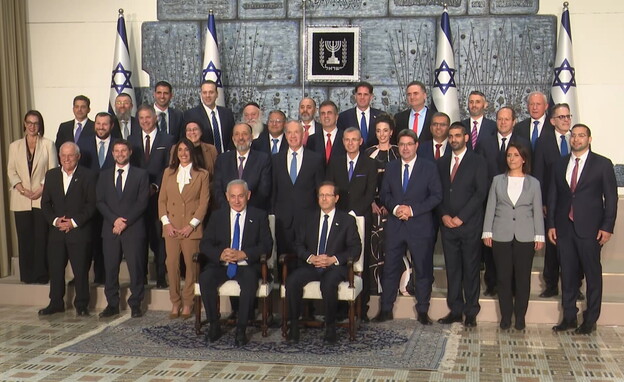
The coalition agreements between the parties of the incoming government will deepen discrimination and racism against Palestinian Arab citizens of Israel. Israeli law already includes dozens of pieces of legislation that grant collective rights to the Jewish majority and discriminate against the Palestinian Arab minority. Moreover, a significant portion of the clauses in the agreements between the parties refer to policies calling for the expansion of settlements financed by the government in various localities including in the occupied West Bank, the Galilee, and the Negev. The government treats the three regions as one.
Key points on the agenda of the new government:
Legislative Reforms
The government will make comprehensive legislative reforms that “will also include the enactment of a basic law [giving it constitutional-like authority in the country]: the Legislation and the Superseding Clause.” The bills will receive absolute and full priority, under any circumstances, in accordance with any other legislation. (Article 30)
The government will work to encourage original productions while emphasizing original productions on Zionism and heritage issues. (Article 66)
The government will work to strengthen the Jewish identity of the country through legislation, allocation of resources and various actions as detailed in this agreement. (Article 89)
In the immigration and naturalization laws, it is stated “in light of the need to fulfill the purposes of the Law of Return and to bring about the immigration of Jews to Israel, and in light of the distribution and characteristics of immigration in recent years, in light of the difficulties and loopholes created by the grandchild section of the Law of Return and the need to prevent assimilation in Israel and to prevent abuse of the rights that the state gives to immigrants who return to their country of origin shortly after immigrating to Israel, will be carried out until the transfer of the state budget will be agreed upon within 60 days by a committee that will be established with the participation of representatives of all the coalition parties.” (Article 91)
The government will amend the Prohibition of Discrimination in Products, Services and Entry into Places of Entertainment and Public Places Law, 2000, so that the possibility of holding any events or studies of the ultra-orthodox and religious who wish to do so, intended for the public or bearers of a distinct religious nature, will be anchored while taking into account their religious beliefs and needs, including gender segregation.
The government will make legislative changes aimed at preventing the definition of segregation as prohibited discrimination, so the law will be amended in a way that will allow the creation and maintenance of residential communities on religious grounds.
It was agreed that the government would regulate legislation regarding the Chief Military Rabbi.
The government will not ratify the Istanbul Convention, to prevent and combat violence against women and domestic violence. The convention clarifies that violence against women and violence in the family are not a matter for the individual, but phenomena that the state has an obligation to eradicate.
The government agreed on strengthening the status of the court and increasing the standards of judges and officials, establishing buildings identical to the courts and removing their subordination to the courts in certain matters such as arbitration.
Budgets for Settlers
The Ministry of National Missions, through the Directorate of Jewish Identity, will formulate a national plan to deepen Jewish identity for a variety of populations (students, spiritual leaders at universities, leaders in public service, etc.); as part of the plan, centers for studies of spiritual heritage and identity will be established and funds will be allocated to encourage Jewish creativity in cinema, music, and culture. The plan will include strengthening of the family unit. For the purpose of implementing the plan, the government will allocate an additional budget in the base of the budget as follows: in 2023 a total of NIS 700 million ($200M), in 2024 a total of NIS 800 million ($227M), and starting from 2025 a total of NIS 950 million ($270M). As necessary, the plan will be brought to the government’s approval. (Article 103)
For the purpose of strengthening the Religious Zionist movement, an addition to the base budget to the tune of NIS 174 million NIS ($50M) will be allocated to eliminate budget deficiencies in in the education system, for education in the agricultural youth villages, for strengthening various educational frameworks, as well as for strengthening the Religious Zionist heritage and its activities, the Religious Zionist House, the Multicultural Heritage Kook, the legacy of Gush Katif (a bloc of 17 Israeli settlements in the southern Gaza strip that was forcibly removed by Israel following its unilateral withdrawal from the Gaza Strip). An addition to the base budget of NIS 110 million ($31M) for the activity of Chabad Zionist Missions abroad. (Article 114)
In order to strengthen the Garin Torani (groups of religious Zionists individuals and families who settle in communities with a low religious population in order to strengthen their connection to religious Judaism), the government will run a “NIS 25 million ($7M) aid program in the cities involved, which will include increasing the sense of security, strengthening resilience, encouraging the absorption of residents, developing young communities, developing culture and infrastructure to support community life.” (Article 152)
Additional Benefits for Soldiers and Officers
The government is evidently not satisfied with the already bloated military budget and will allocate additional funds that will deepen discrimination against citizens who did not serve in the army.
Religious Zionism leader Bezalel Smotrich, who will serve as Minister of Finance in the first half of the term and as Interior Minister in the second half, demands a budget increase to raise the salary of regular servicemen by 20% and the salaries of the soldiers to the minimum wage.
Scholarships will be allocated to military veterans and free preparatory school funding will be provided, with a full one-year scholarship being provided for every year of military service.
The government will work to discriminate against Arab candidates and will prefer military veterans in the fields of medicine, law, computer science, accounting, and engineering.
Education
The government will work to deepen the curriculum on the history of Zionism and Jewish heritage. In addition to this, the government will work to promote and establish Ariel University in the occupied West Bank, focusing on research and teaching in order to compensate for its exclusion from agreements with the European Union, Asian countries, and international funds. This is part of the government’s decision to turn the city of Ariel into a university city and establish a university in the Galilee.
The Ministry of Settlement will be renamed the Ministry of National Missions. It was also agreed to fulfill the purposes of the Law of Return, to bring about the immigration of Jews to Israel, and promote conversion reform through a state conversion body.
The Deepening of the Occupation
Regarding the settlements in the occupied territories, the government treats them as it treats the transfer of Jews to the Negev and the Galilee. It was determined that within 60 days of the establishment of the new government, the government will make a decision regarding the regulation of a new settlement.
In a move that would deepen the occupation, the government will work to regulate “the aspects required for the operation of the Rachel’s Tomb complex, including budgetary aspects.” (Article 117)
Under the definition of “humanitarian connection to electricity, water, essential public infrastructure,” the government will advance the legislation to regulate the connection of the illegal settlements in the occupied territories to such infrastructure. In addition, there will be an “optimization of the services provided in Judea and Samaria [occupied West Bank] in accordance with Resolution 106 of 1981.”
The government’s settlement division will regulate its position and role in the legislation, thus allocating a total of NIS 750 million ($213M) per year which will be anchored in the base budget. The budgets will be allocated and approved for the development and strengthening of settlements according to the five-year plan.
The government will work for the existence, safety, and establishment of Jewish settlement in Hebron.
Tax benefits will be granted to settlements in the occupied West Bank and in areas with a high security risk starting in 2023.
The procedures for relocating IDF bases in the occupied West Bank will be completed, with an emphasis on Bet El and Kiryat Arba.
The Negev and Galilee
Budgets will be transferred to strengthen the “Jewish settlement in Arad,” a Jewish city in the Negev. The planning procedures for the city of Kasif, a future planned ultra-Orthodox city in the Negev region, will continue and be accelerated. Approximately 14 settlements in the Negev will be continued and accelerated and NIS 800 million ($227M) will be budgeted each year.
A plan to build a university will be one of the engines of growth in the Galilee.
The government will promote the relocation of the IDF’s rehabilitation and maintenance centers to Tsiporit and will establish the settlement of Arbel in the Galilee. The government will also pass a law for the development of the Galilee and plans to increase the budgets intended for the Bedouin Authority in the Negev, which carries out demolition and evacuation operations in unrecognized villages.
Planning and Building
The government will amend the “Admissions Committee Law” in small settlements in the Negev, Galilee, and occupied West Bank. This law legalized admissions committees that operate in hundreds of small localities and gives them full discretion to accept or reject applicants, thus controlling who is eligible to reside there. (Article 147.2)
The government will repeal the Electricity Law enacted last year, which gave thousands of Palestinian-Arab households access to electricity.
The government will “frustrate the project of taking over open areas with the help of international parties” to protect Israeli interests. In addition, the government will bolster the northern border settlements with 2,000 new families.
The government will transfer the supervisory authority over planning and construction laws to the Ministry of Internal Security, which will likely dramatically increase demolition orders against thousands of houses built in Palestinian-Arab localities.
The Palestinian Authority and Jerusalem
Funds will be invested in the “establishment and development of Jerusalem as the capital of Israel in large-scale construction, employment infrastructures, and budgets. The government will work to maintain sovereignty over the city, strengthen governance, and thwart the activities of the PA in Jerusalem.
To the extent that the Palestinian Authority promotes measures against Israel in The Hague and in international courts, the government will formulate policies and measures against the Palestinian Authority and its actions. The government will act in every way to prevent the transfer of funds from various sources that will be transferred by the Palestinian Authority to prisoners and their families.
The government will examine the employment of teachers trained in PA institutions. The government will also examine ways to deal with what it defined as “the anti-Semitic law of the Palestinian Authority that prohibits the sale of land to Jews and imposes the death penalty on sellers.”
Violence in Arab Society
In the coalition agreements, incoming National Security Minister and leader of the Jewish Power party Itamar Ben-Gvir will have expanded powers over the police. Ben-Gvir, who is known for his racist attitudes towards the Arabs, will exacerbate police violence against Palestinian Arab citizens and disadvantaged populations.
The government will direct the Shin Bet (the internal security agency) to deal with nationalist crimes (not just terrorism) among Palestinian Arab citizens of Israel in terms of surveillance, prevention of incitement, thwarting of protests and international organizations, investigation and prosecution. The government will also push for the enactment of a law to deny citizenship and residency to terrorists and accomplices.
The government considers the problem of rising crime and violence in Palestinian Arab society to be a major issue that must be dealt with as a priority for the benefit of the personal safety and quality of life of Palestinian Arab citizens of Israel, as well as all citizens of the country. Thus, the government will allocate resources and tools for the purpose of enforcing and eradicating crime and illegal activity in Arab society. (Article 32)
Human Rights Organizations
In compliance with Smotrich’s demands regarding human rights associations, the government will dissolve organizations financed by external parties and international funds. This will severely harm Palestinian Arab civil society and will further entrench human and civil rights violations against minorities in the country.
The Authority for Economic Development in the Arab Society
The Authority for Economic Development in the Arab Society will be transferred from the Ministry of Social Equality to the Prime Minister’s Office at the request of the Center for Local Government. This is intended to prevent damage to the budgets intended for the Palestinian Arab communities.
The government will also work to “expand the Israeli labor market through the integration of populations into employment, investment in employment programs for the ultra-orthodox and Arab sectors, a program to promote human capital, and improve high-tech skills.” (Article 28)
This is the most extreme right-wing government since the establishment of the state. It calls for the dissolution of democratic norms, eliminating judicial oversight, discriminates against its citizens on the basis of race, sex, and religion, and leaves no room for minorities by infringing on their basic rights. The coming months and years of this government will be tumultuous for all those living and the region, a fact which cannot be understated.

























